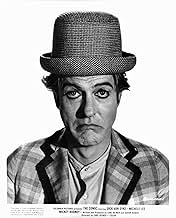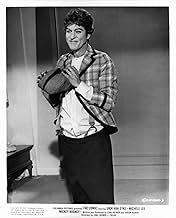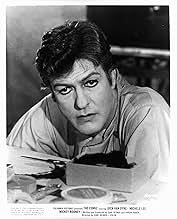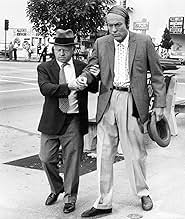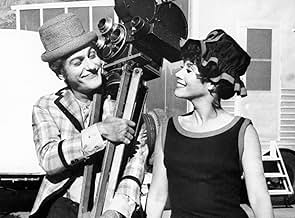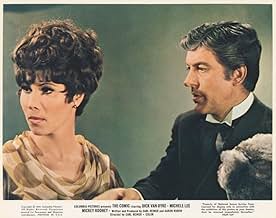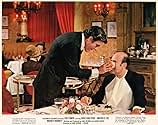CALIFICACIÓN DE IMDb
6.4/10
1.1 k
TU CALIFICACIÓN
Historia de un brillante cómico del cine mudo cuyo talento se ve eclipsado por su ego.Historia de un brillante cómico del cine mudo cuyo talento se ve eclipsado por su ego.Historia de un brillante cómico del cine mudo cuyo talento se ve eclipsado por su ego.
- Dirección
- Guionistas
- Elenco
Gavin MacLeod
- 1st Director
- (as Gavin Mac Leod)
Isabel Sanford
- Woman in Detergent Commercial
- (as Isabell Sanford)
- Dirección
- Guionistas
- Todo el elenco y el equipo
- Producción, taquilla y más en IMDbPro
Opiniones destacadas
Short and Sweet, to the point will be my Comment....This was My Late Dad's and My Favorite Movie...One of the Last things I said to him, where he could still recognize me, at his bedside was..."Ya Got Good Color", It made him smile...his last smile...That's a powerful ability, for any movie...thank you...Dr Buck....OK, so I guess I need to add more working to my comment section, or so they (the computer powers to be), tell me..10 lines, hmmmmm, well, guess I might ad that not only is this Van Dyke's finest film moment (love his dual roll as father and son), but also Mickey Rooney's ...as Cock-Eye....if you're a fan of him, check out the little known movie...The Atomic Kid...Everytime I eat a peanut butter sandwich, I smile (see the movie to understand that comment...T.Y. Again (OK, now is that enough words?)
This film was obviously made to use the comic talents of Dick Van Dyke and they did. He was always pulling faces and doing pratfalls on stage and TV and has always had a strikingly strong resemblance to a young Stan Laurel. It had been said in early magazines that Van Dyke felt he was born in the wrong era. With this film he gets to fulfill his dream. Even the dialog scenes play and read like a silent movie and the comedy timing is priceless, especially in scenes with Mickey Rooney who did the eye tricks with no computer help. Michelle Lee is there, for her looks mostly, plus a lot of great cameo comedy bits by the likes of Pert Kelton, Jeannine Riley and even Carl Reiner himself. This film will not be remembered as any great classic, but it does remain a classic in capturing Van Dyke's talent and the memories of Hollywood days gone by.
I have just seen this movie for the first time in over 25 years. I still remember the last time I saw it. It was not a great movie by any means but I am a big film fan and this movie was memorable for me. The last scene of Van Dyke's character getting up in early morning hours just to watch one of his old films with his ex-wife always stuck with me. It is a really sad scene. Van Dyke is great in this, he would have made a great silent comedian. While the character is obviously based an awful lot on Buster Keaton, Van Dyke to me actually resembles Stan Laurel at times. The brief clips of the silent films his character does make you want to see the entire films. I also enjoyed Mickey Rooney's performance, too. I highly recommend this to anyone who is a silent movie fan or a Dick Van Dyke fan.
Carl Reiner's 1969 film, "The Comic," like Elia Kazan's 1957 movie, "A Face in the Crowd," is a cautionary tale about fame and Hollywood. Both deserved more attention, and truth to tell, some awards (or at least some nominations), and gained notoriety years after their release as fans and film aficionados discovered the works amid new appreciation for earlier eras. "The Comic" is arguably one of the most overlooked films of the inside-Hollywood genre, probably because it came along in a period when the film industry was convulsing into a grittier, more realistic phase (indeed a year when John Wayne in "True Grit" competed against both stars of the X-rated "Midnight Cowboy," with Wayne winning best actor and "Cowboy" winning best picture _ talk about a mixed cinematic metaphor). In "The Comic," a roman a clef which was written, produced and directed by Carl Reiner, Dick Van Dyke plays the fictitious silent film star Billy Bright (the film's initial title was the name) _ a character that in itself has caused some debate as to who it was really based on, with many saying it's a composite of Harry Langdon, Buster Keaton and Stan Laurel, the latter Van Dyke's hero and friend. Others also have seen shades of Harold Lloyd. Having interviewed Van Dyke some years later when he spoke fondly of Laurel and how they met, describing how he delivered the eulogy at Laurel's funeral, and how anxious he was to discover the whereabouts of the comedian's famed bowler hat that he said he had been promised but never received (I was pretty sure I knew the guy who had it and shared the information), I find it difficult to believe he would have based the character on someone about whom he cared so deeply. At any rate, as a denizen of Hollywood and a fan of the silents who grew up at a time when many of the old comics were still around and re-emerging, I can say without hesitation that Van Dyke got it right and hit a home run in what is perhaps the best work of his career (Van Dyke doesn't get enough credit for the fine work he did in films, largely because he came along at a time when the division between TV and film was great and the film people still looked down upon their TV counterparts, and again, film was in the midst of a great transition). Reiner (known to later generations as Rob Reiner's Dad, but to many of us as the brilliant second banana on Sid Caesar's early-TV "Show of Shows" and one half of the 2000-year-old man comedy team with his friend Mel Brooks) constructs the film beautifully from the opening sequence at Billy's funeral. The latter, an absolute hoot, contains an overhead shot of cars driving on the way to the burial plot that will have you struggling to keep a straight face at every funeral you attend from here on out, and while that isn't a humorous thing, it demonstrates the power and the rightness of the moment. One of the more fascinating elements of the film is a Hollywood story-within-a-story, how Carl Reiner's pacing and sense of comedic irony laced with sadness and the sense of smiling through the tears influenced his own son Rob's acting and directing style. Now there's a subject for a future film. "The Comic" is a keeper and deserves to be seen and more widely discussed, if only to shed more attention on the silent era lest it be forgotten in a time of pyrotechnic overkill.
Brilliantly realized tragicomedy in a Citizen Kane framework, obviously based on Buster Keaton. A tour de force for Dick Van Dyke, whose film work was inconsistent at best. But he nails Billy Bright from word one, and Carl Reiner's concise script gives him room to run. Reiner's no slouch, either; check the restaurant meeting for some biting wit on the Let's Do Lunch mentality. A boxoffice flop in '69-'70, tossed away on the lower half of double bills, or sent directly to subrun houses, this is a semi-classic that should be seen by all who love, or study, films.
¿Sabías que…?
- TriviaWhile starring in The Dick Van Dyke Show (1961), Van Dyke called up Stan Laurel to ask for permission to do a Laurel & Hardy bit in an episode. Laurel told him that neither he nor Hardy's heirs owned the rights to the characters. Van Dyke and Reiner were horrified that Laurel didn't even own the rights to his own face, and this picture is the result.
- ErroresWhen Billy and Cockeye are walking along the Hollywood Walk of Fame, they are on Vine Street near the intersection of Selma Avenue. However, the stars' markers they point out are not in a row, or even near each other at that location.
- Citas
[first lines]
Passerby at Billy's Funeral: Who checked out?
Hearse Driver: An old-time movie actor.
Passerby at Billy's Funeral: ... What's his name?
Hearse Driver: Billy Bright.
Passerby at Billy's Funeral: Billy Bright? Billy Bri-...
Hearse Driver: Yeah - he was a comedian, back in the silent movies.
Passerby at Billy's Funeral: ... Oh! Billy Bright! I thought he *was* dead!
- ConexionesFeatured in Dick Van Dyke 98 Years of Magic (2023)
- Bandas sonorasYes! We Have No Bananas
Written by Frank Silver and Irving Cohn
Performed by Dick Van Dyke
Briefly sung by Billy Bright in voiceover and used as a leitmotif throughout the film
Selecciones populares
Inicia sesión para calificar y agrega a la lista de videos para obtener recomendaciones personalizadas
- How long is The Comic?Con tecnología de Alexa
Detalles
- Fecha de lanzamiento
- País de origen
- Idioma
- También se conoce como
- The Comic
- Locaciones de filmación
- Vine St & Selma Ave, Los Ángeles, California, Estados Unidos(where Billy & Cockeye star their stroll along the Hollywood Walk of Fame)
- Productora
- Ver más créditos de la compañía en IMDbPro
- Tiempo de ejecución1 hora 34 minutos
- Mezcla de sonido
- Relación de aspecto
- 1.85 : 1
Contribuir a esta página
Sugiere una edición o agrega el contenido que falta

Principales brechas de datos
By what name was El cómico (1969) officially released in India in English?
Responda
